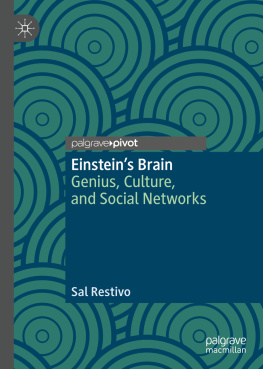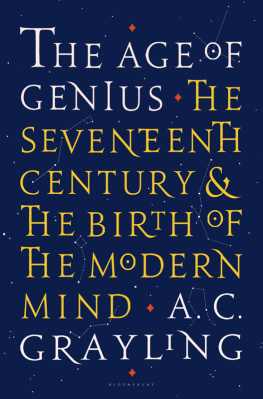
Genius in France
Genius in France
AN IDEA AND ITS USES
Ann Jefferson
PRINCETON UNIVERSITY PRESS
PRINCETON AND OXFORD
Copyright 2015 by Princeton University Press
Published by Princeton University Press, 41 William Street, Princeton, New Jersey 08540
In the United Kingdom: Princeton University Press, 6 Oxford Street, Woodstock, Oxfordshire OX20 1TW
press.princeton.edu
Jacket image: Neuroglia cells (so-called genius cells)
All Rights Reserved
ISBN 978-0-691-16065-8
Library of Congress Control Number: 2014950433
British Library Cataloging-in-Publication Data is available
This book has been composed in Minion & Avant Garde
Printed on acid-free paper
Printed in the United States of America
10 9 8 7 6 5 4 3 2 1
for Mike, again
O his breaths, his heads, his racing; the terrible
swiftness of the perfection of forms and of action.
O fecundity of the spirit and immensity of the
universe!
Let us, on this winter night, from cape to cape, from the tumultuous pole to the castle, from the crowd to the beach, from glance to glance, our strengths and feelings numb, learn to hail him and see him, and send him back,
and under the tides and at the summit of snowy deserts, follow his seeing, his breathing, his body, his day.
Rimbaud, Gnie, Illuminations
TRANSLATED BY JOHN ASHBERY
Contents
Illustrations
Preface
This book owes its existence to a chance conversation over dinner in Edinburgh some thirteen years ago, during the course of which I realized for the first time that genius is a word that it is risky to claim to understand. This discovery bothered me, and I began to read. One thing led to another, and by the time I had amassed a sizeable bibliography I had the good fortune to teach a graduate seminar in the Department of French and Romance Philology at Columbia University during the fall semester of 2006; the enthusiasm of the participants confirmed my sense that there were so many things one might mean by genius that it was worth writing a book about them. Let me therefore begin these preliminary remarks by recording my gratitude to Peter France and Peter Dayan for that conversation, to my colleagues at Columbia for my time as visiting professor, and to the students in the seminar for the zest and the diligence with which they entered into the spirit of the project.
I have been equally blessed by the generosity of friends and colleagues whose own interest in genius has provided me with a treasure trove of thoughts and references on which to draw. Even where I have not directly incorporated these leads, they have all nourished my reflections and contributed to my understanding of the topic. Over and above the specifics of information, reference, and quotation, the conversations I have had and the emails that followed have been a precious reassurance that my curiosity about genius is more widely shared. I hope there are no deserving names missing from this list, but I should like to place on record how much I owe to Frdrique At-Touati, Alain Ausoni, Claire Bazin, Terence Cave, Tim Chesters, Nicholas Cronk, Tim Farrant, Sam Ferguson, Simon Gaunt, Angelica Goodden, Mairad Hanrahan, Nick Harrison, Wojciech Jajdelski, Andrew Kahn, Catriona Kelly, Marie-Chantal Killeen, Orsolya Kiss, Dilwyn Knox, Elisabeth Ladenson, Robin Lane Fox, Karen Leeder, Ann Lewis, Jane Lightfoot, Katherine Lunn-Rockliffe, Francesco Manzini, Toril Moi, Jonathan Morton, Adeline Mueller, Bradley Murray, Sotiris Paraschas, Thomas Pavel, Roger Pearson, Will Poole, the late Siegbert Prawer, J. C. Smith, Galin Tihanov, Kate Tunstall, Alain Viala, Caroline Warman, Wes Williams, Jenny Yee, and Andrei Zorin.
I also wish to thank the organizers and audiences of the various seminars and conferences that gave me a chance to air early versions of some chapters and to profit from responses to them. In this connection, I should like to make special mention of Brigitte Mahuzier and the students who took the seminar I shared with Elisabeth Ladenson in the summer of 2010 at the Institut dtudes franaises in Avignon run by Bryn Mawr College.
The Taylorian Library at the University of Oxfordnotably in the person of Nick Hearn, the French subject specialist, to whom I am particularly gratefulthe Bibliothque nationale de France, the Butler Library at Columbia University, Google, and numerous online libraries have all been indispensable in providing the material on which this book is based.
Special thanks are due to the people who devoted time and energy to reading parts of the manuscript in draft: Marine Ganofsky, Miranda Gill, Mike Holland, Jean-Alexandre Perras, and the anonymous reviewers appointed by Princeton University Press who read everything. Their comments and suggestions have been invaluable, but any errors or omissions must be laid at my door, not theirs.
It has been a joy at every stage to work with Princeton University Press, and I am particularly grateful to Ben Tate for his genial encouragement throughout.
Hannah Paul and Diane Bergman provided indispensable help in producing the illustrations.
Parts of the introduction appeared in an earlier version as Genius and Its Others in Paragraph 32 (2010), and I am grateful to the editors and to Oxford University Press for permission to use this material.
I am keen to report that this book has not been the beneficiary of any kind of award from any research funding body, but only of the sabbatical leave scheme of Oxford University. My gratitude goes to New College and to the Faculty of Medieval and Modern Languages for their trust and for the intellectual encouragement that the scheme provides. Long may it continue.
Mike Holland has put up with living with genius for a very long time, while also making his own contributions to the result. There is no one else I could conceivably dedicate the book to.
Ann Jefferson
Oxford, December 2013
Genius in France
Introduction
[W]e ought to know what genius is.
Marjorie Garber, Academic Instincts
[L]et us not pretend to understand what genius means.
Derrida, Larchologie du frivole
Genius is a word with a long history, two etymological origins, and, according to the Oxford English Dictionary, seven distinct meanings, each with several subcategories. Yet since the eighteenth century the term has often been deployed in the Western world as if its sense were entirely obvious, with speakers relying on an assumption of cultural consensus to pass genius off as a self-explanatory notion. It was taken up by all the major European languages in response to the need for a word that would express the new sense of the value of exceptional creative originality. An accolade that defines its object as an exception in a class of its own, genius serves as a sort of super-superlative, possessing rather more evaluative purpose than precise semantic content. At the same time, it indicates the distinctiveness of the person to whom it is applied, the stamp of individuality being the guarantee of the originality that was increasingly associated with the term. Genius is therefore exceptional on two different counts, superior quality and distinctive character, so that to speak of the genius of Mozart, for example, is both to place Mozart at the top of some hypothetical ranking of composers, and to allude to the particular character of his music.
If one pauses to reflect, however, genius is oddly hard to define, and what is odder still, this does not seem to count against its viability as a concept. Speakers continue to use the word as if they can count on listeners to understand what they mean, and the attribution of genius is often used as a clincher in discussions as if to suggest that the word is entirely self-justifying. In the early days of writing this book I attended two memorial services for people whose qualities were recalled in some detail, before the eulogista different one in each caseconcluded with a version of the statement: In sum, he was a genius. In the same vein, and around the same time, I overheard a student telling a friend how much he admired Dickens as a writer, and once again, after brief reflective pause, he summarized his view with the words: Well, he was just a genius. End of story. Except that genius as a general phenomenon has regularly attracted comment and analysis, as if its lack of semantic precision were a vacuum that commentators were repeatedly drawn to fill. And often in the most interesting ways. It is with these interesting waysin other words, with the many uses to which genius has been putrather than with any attempt at definition that this book is concerned.
Next page









